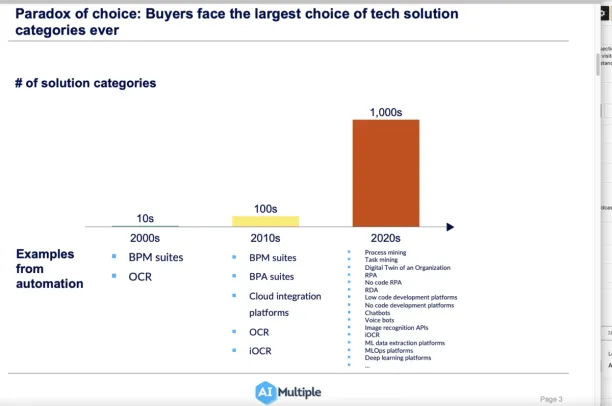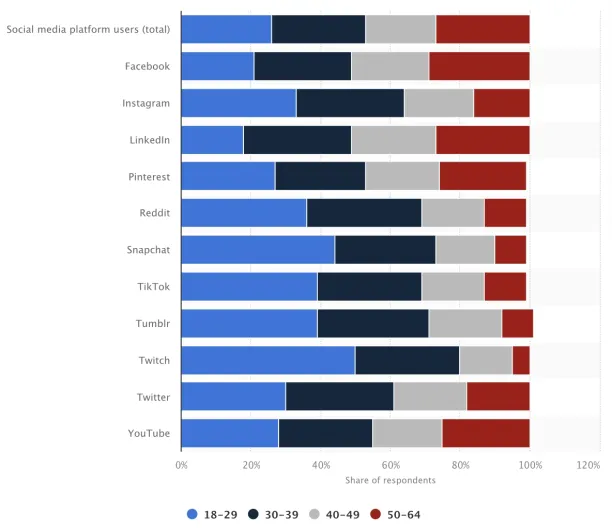5 Challenges & 10 Strategies in B2B Startup Marketing [2024]
According to the Bureau of Labor Statistics, 8 out of 10 startups fail in their first year.1 Although there are many reasons for startup failures, lack of marketing strategy and its execution is one of the main reasons for it.2
Despite the importance of B2B startup marketing, many executives have a lack of information regarding this. To help startups to scale up, in this article, we will define top 5 challenges of B2B startup marketing with 9 strategies to mitigate them.
What is B2B startup marketing?
B2B startup marketing refers to the marketing strategies and tactics used by startups that sell products or services to other businesses. The goal of B2B startup marketing is to identify, reach, and build relationships with potential customers who are decision-makers at other companies.
Why is B2B marketing important for startups?
B2B marketing is essential for startups in increasing brand awareness and attracting new customers. B2B marketing strategies have the ability to focus on a startup’s unique offerings and strengths in order to build relationships with potential partners, who can potentially help facilitate growth.
According to a post-pandemic McKinsey report, 90% of B2B executives and decision-makers think that remote, digital sales strategies will be part of the post-pandemic normal life.3 This means that the competition will increase due to a decrease in in-person marketing and the businesses will need more creative strategies to attract and ensure customers.
B2B marketing provides startups the opportunity to establish trust with their target audience and differentiates them from the competition by providing educational materials, which vendors and distributors rely on when considering partnerships. In today’s competitive marketplace it is important for startups to maximize B2B marketing in order to stand out from the crowd and remain competitive.
What are the challenges of B2B marketing for startups?
1. High competition
B2B tech markets are crowded and highly competitive, which can make it challenging for startups to differentiate themselves and stand out from the competition (see Figure 1).
Figure 1. The number of tech solution categories is rapidly increasing each decade.

2. Building a brand and gaining trust from scratch
B2B startups can lack brand recognition and may have to work harder to establish themselves as a credible and trustworthy business. B2B purchases are generally high-value and involve a longer sales cycle, so it’s important to establish trust with potential customers. This can be challenging for a new startup without a proven track record.
3. Proving ROI
Businesses are looking for a specific return on investment (ROI) when considering a new product or service. It can be difficult for startups to demonstrate how their product or service will provide a positive ROI.
4. Limited budget and resources
Startups usually have limited budgets and resources. However, marketing can be costly, which can make it difficult for startups to execute an effective marketing strategy. Startups can initially tend to use free and low-price platforms and strategies as a remedy.
5. Reaching the right audience
B2B marketing often requires a targeted approach, and it can be difficult to identify and reach the decision-makers within a company who have the authority to make purchasing decisions. To mitigate this, startups can focus on their networking.
Top 10 B2B marketing strategies to overcome challenges
To mitigate these challenges, startups should implement a right marketing strategy that suits their needs and aims.
In initiating B2B marketing strategy, they should watch over some differences than established companies because of their qualities like:
- a need for more creativity due to the restriction of a limited budget
- a need for a quick adaptation skill for product-market fit as they grow
- Difficulty to reach talented workers including marketers
In light of these, here are some best practices step by step.
1. Define your marketing goals
The first and fundamental step for a successful marketing strategy is to define your marketing goals. To initiate this, you can use SMART goals strategy.4 Your goals must be:
- specific
- measurable
- achievable
- realistic
- time-related
Without establishing achievable and measurable objectives, you’ll struggle to track your success levels and evaluate whether or not your startup marketing plan is proving successful. For example, instead of aiming to “enhance brand recognition,” make your goal more specific: “Boost web traffic from prospects by 25% in half a year.”
2. Target a market segment
Many B2B tech startups struggle with marketing their products and services, simply because they are unclear who their ideal customers are.
Identifying your target audience is critical for success, as it enables you to narrow down and direct your marketing efforts while gaining valuable insight into the needs of consumers.
The first step in refining your target audience is to recognize the traits of your ideal customer or persona such as:
- valuable demographic and personal information
- needs, goals and pain points
- business and job information
After knowing your target audience, it is easier to determine which types of marketing strategies you should initiate. For example, the company size of your target audience should determine which types of marketing types and mediums you will use.
3. Analyze your competitors
B2B startup marketing requires startups to stay ahead of the competition. One essential step in achieving this is by evaluating and analyzing competitors in your B2B space. Competitor analysis entails monitoring your opposition’s:
- products or services
- pricing
- customer service
- marketing strategies
Additionally, it is also vital for B2B startups to look at trends in their respective space, gain consumer feedback, and recognize industry opportunities.
4. Prepare a marketing plan
Planning a marketing plan is key to ensuring your B2B tech startup succeeds. When preparing a B2B startup marketing plan, there are a few key elements to consider.
- Building an identity will help ensure potential customers remember and recognize your B2B tech startup.
- Developing an effective strategy and budget are crucial aspects in creating a successful B2B marketing plan.
- Taking advantage of digital media such as social media marketing and search engine optimization (SEO) is critical to engaging current and potential customers.
- It’s vital to measure performance regularly with analytics so that weak points in the B2B tech startup’s marketing strategy can be improved upon quickly.
5. Implement performance metrics
As part of marketing practice, B2B tech startups can use several types of metrics to prove the return on investment (ROI) to investors. These can include:
- customer acquisition cost (CAC)
- lifetime value (LTV)
- retention rate
- lead-to-customer conversion rate
- sales cycle duration, etc.
6. Use different marketing types effectively
Leveraging different marketing strategies is important. These strategies include:
- Content marketing: creating and sharing valuable content such as blog posts, white papers, webinars
- Email marketing: a traditional yet effective method for reaching out to businesses to nurture leads and stay top-of-mind with potential customers
- Paid advertising: a great way to quickly generate leads, but can be quite costly for startups
- SEO: optimizing your website or web page in order to improve its ranking in the SERPs for relevant keywords or phrases
On which strategy you will invest more depends on the current stage of your business, audience, and your aims.
7. Find the best platform for your aims
B2B tech startups need to be strategic when it comes to deciding which marketing platform is right for promoting their product or service. There are many options available, such as social media, content marketing and email campaigns.
Although traditional channels like email or online ads are important, determining your target audience correctly should shape your preferences.
For example, LinkedIn is often the primary platform selected by B2B tech startups since it provides a platform tailored to older B2B buyers. However, based on your audience, you may also benefit from exposure in channels like YouTube or Twitter (see Figure 2).
Figure 2. Distribution of leading social media platform users in the United States as of August 2022, by age group

Source: Statista
Also, podcasts are a great way to successful marketing for B2B startups. By utilizing podcasts, you can:
- establish thought leadership in your industry
- attract and retain potential customers via engaging content
- access a large audience via multiple media devices
8. Offer a free trial to your customers
In terms of product-led growth (PLG), offering a free trial can be an effective marketing strategy for B2B tech startups for a few reasons:
- It allows potential customers to test out your product or service before committing to a purchase.
- It can help to generate leads and increase conversions. When potential customers can try out your product or service for free, they are more likely to become paying customers.
- It can help to improve your product as free trials allow potential customers to provide valuable feedback on your product.
- It creates urgency and scarcity by putting a time limit on the free trial, which can encourage potential customers to sign up and try out your product or service before the offer expires.
9. Initiate networks with business partners
Initiating a business network as a B2B tech startup is important because it can help to increase visibility for your startup and expand your reach to potential customers and partners. Also, you can gain access to a wealth of expertise valuable to the development and growth of your business.
To initiate your business network, you can:
- attend industry events and conferences
- join industry-specific groups and organizations
- promote referral marketing
10. Encourage referral marketing
Referral marketing is a strategy that involves encouraging existing customers to refer new businesses to your startup. This can be a highly effective way to generate new leads and sales, as people are more likely to trust the recommendations of people they know and trust.
For startups, referral marketing can be particularly effective because it can help to build credibility and trust quickly. When a potential customer sees that others they know and trust are using and recommending your product or service, they are more likely to consider it themselves even if the business is at the startup stage.
If you have questions or need help regarding B2B startup marketing, feel free to reach out:
External Links
- 1. Table 7. Survival of private sector establishments by opening year, https://www.bls.gov/bdm/us_age_naics_00_table7.txt. Accessed 13 January 2023.
- 2. “3 Marketing Strategies Perfect For Early-Stage Startups.” Forbes, https://www.forbes.com/sites/abdoriani/2022/05/05/3-marketing-strategies-perfect-for-early-stage-startups/?sh=381bf6ab684a. Accessed 13 January 2023.
- 3. “B2B Pulse: Insights from our latest global survey.” McKinsey, 16 March 2021, https://www.mckinsey.com/capabilities/growth-marketing-and-sales/our-insights/survey-global-b2b-decision-maker-response-to-covid-19-crisis. Accessed 13 January 2023.
- 4. https://en.wikipedia.org/wiki/SMART_criteria

Cem has been the principal analyst at AIMultiple since 2017. AIMultiple informs hundreds of thousands of businesses (as per similarWeb) including 60% of Fortune 500 every month.
Cem's work has been cited by leading global publications including Business Insider, Forbes, Washington Post, global firms like Deloitte, HPE, NGOs like World Economic Forum and supranational organizations like European Commission. You can see more reputable companies and media that referenced AIMultiple.
Throughout his career, Cem served as a tech consultant, tech buyer and tech entrepreneur. He advised businesses on their enterprise software, automation, cloud, AI / ML and other technology related decisions at McKinsey & Company and Altman Solon for more than a decade. He also published a McKinsey report on digitalization.
He led technology strategy and procurement of a telco while reporting to the CEO. He has also led commercial growth of deep tech company Hypatos that reached a 7 digit annual recurring revenue and a 9 digit valuation from 0 within 2 years. Cem's work in Hypatos was covered by leading technology publications like TechCrunch and Business Insider.
Cem regularly speaks at international technology conferences. He graduated from Bogazici University as a computer engineer and holds an MBA from Columbia Business School.
To stay up-to-date on B2B tech & accelerate your enterprise:
Follow on

Comments
Your email address will not be published. All fields are required.